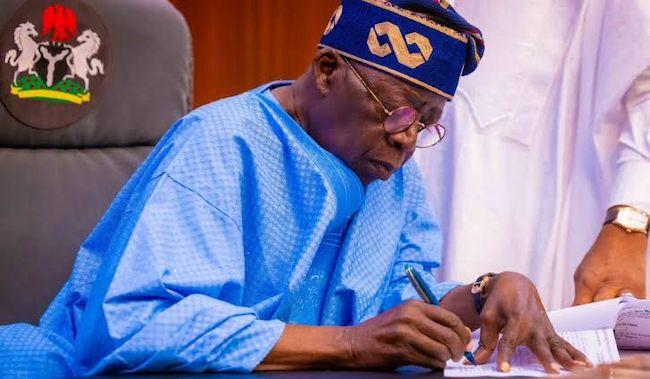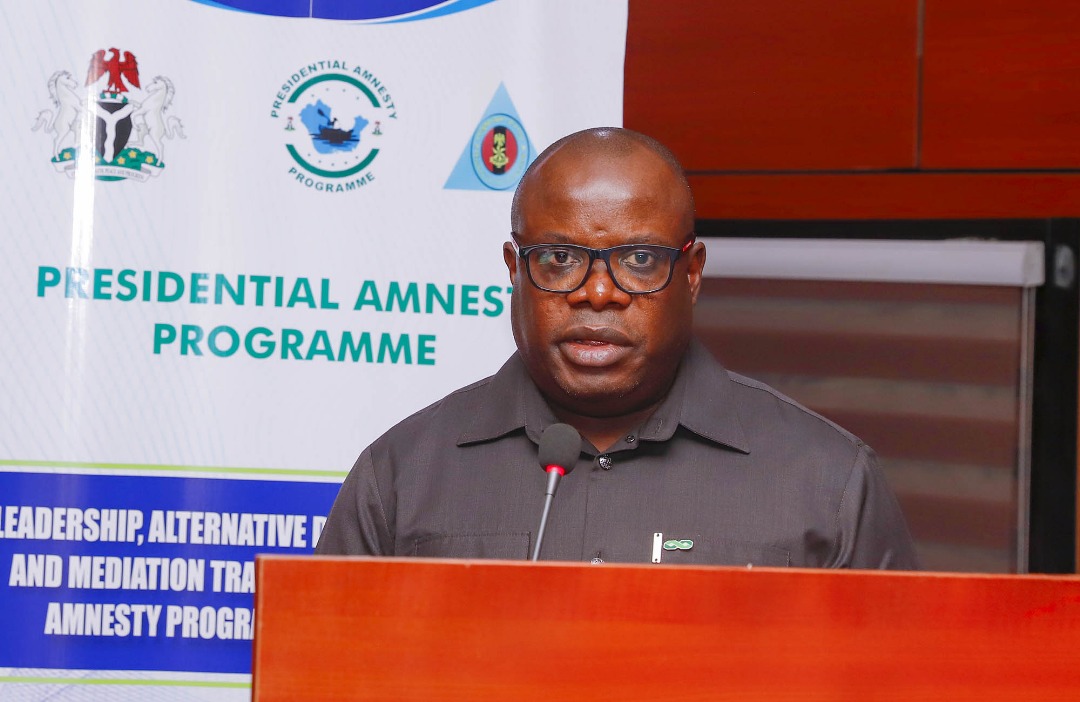News
JUST IN: Tinubu Reconstitutes Leadership Of 12 River Basin Devt Authorities

President Bola Ahmed Tinubu has approved the reconstitution of the executive management teams for 12 River Basin Development Authorities (RBDAs) under the Federal Ministry of Water Resources, signaling his administration’s commitment to enhancing the efficiency of these critical organizations.
The newly appointed executives are expected to leverage their expertise to boost agricultural productivity, manage water resources, and foster rural development in alignment with the administration’s commitment to improving the lives of Nigerians.
The new appointments were made public on Wednesday in a statement issued by Special Adviser to the President on Information and Strategy, Bayo Onanuga.
The appointments reflect a commitment to regional representation and technical expertise, aimed at enhancing water resource management and agricultural productivity.
The Ogun-Osun River Basin Development Authority, covering Lagos, Oyo, Ogun, and Osun states, will now be led by Hon. Odebunmi Olusegun (Chairman, Oyo), Engr. Dr. Adedeji Ashiru (Managing Director, Osun), Ayo Oyalowo (Executive Director, Finance, Oyo), Dokunmu Olufemi Oyekunle (Executive Director, Planning and Design, Ogun), Suleiman Oris (Executive Director, Agric Services, Lagos), and Engr. Julius Oloro (Executive Director, Engineering, Lagos).
READ ALSO: JUST IN: Tinubu Arrives Lagos For Yuletide
In the Upper Benue River Basin Development Authority, serving Adamawa, Taraba, Gombe, and Bauchi states, the team includes Alh. Sanusi Mohammed Babantanko (Chairman, Bauchi), Samuel Mahmud Mohammed (Managing Director, Taraba), Hon. Usman Babandubu Bakare (Executive Director, Engineering, Taraba), Ibrahim Dasuki Jalo (Executive Director, Finance, Gombe), Hon. Isa Matori (Executive Director, Planning and Design, Bauchi), and Hamman Dikko (Executive Director, Agric Services, Adamawa).
For the Chad Basin Development Authority, covering Borno, Yobe, and Adamawa, the appointed members are Prof. Abdu Dauda (Chairman, Borno), Tijjani Musa Tumsa (Managing Director, Yobe), Barr. Bashir Baale (Executive Director, Finance, Yobe), Iliyasu Muazu (Executive Director, Agric Services, Adamawa), Engr. Mohammed Shetima (Executive Director, Engineering, Borno), and Vrati Nzonzo (Executive Director, Planning and Design, Borno).
The Benin-Owena River Basin Development Authority, which oversees Edo, Delta North, Ondo, and Ekiti, has Hon. Mike Ohio Ezomo (Chairman, Edo), Femi Adekanbi (Managing Director, Ondo), Dr. Austin Nonyelim Izagbo (Executive Director, Planning and Design, Delta), Hon. Johnson Oghuma (Executive Director, Agric Services, Edo), Adegboyega Bamisile (Executive Director, Finance, Ekiti), and Bayode Akinduro (Executive Director, Engineering, Ondo).
In the Niger Delta Basin Development Authority, which serves Rivers, Bayelsa, and Delta states, Chief (Barr.) Ebikemi Boi Bosin (Chairman, Delta), Hon. Amgbare Ebitimi (Managing Director, Bayelsa), Chief (Mrs.) Mary Alagoa (Executive Director, Finance, Rivers), Dr. Austin N. Izagbo (Executive Director, Engineering, Delta), Mr. Felix Kurogha (Executive Director, Agric Services, Bayelsa), and Barr. (Dr.) Nnamdi Akani (Executive Director, Planning and Design, Rivers) will lead the team.
READ ALSO: JUST IN: Tinubu Presents N49.7tn 2025 Restoration Budget
The Upper Niger River Basin Development Authority, covering Niger, Kaduna, and the Federal Capital Territory (FCT), includes Haruna Y. Usman (Chairman, Niger), Dangajere Shuaibu Bawa Jaja (Managing Director, Kaduna), Mohammed Usma (Executive Director, Finance, Niger), Dr. Abdullahi A. Kutso (Executive Director, Planning and Design, Niger), Ayuba Waziri Tedde (Executive Director, Agric Services, FCT), and John Hassan (Executive Director, Engineering, Kaduna).
For the Lower Niger River Basin Development Authority, which operates in Kwara and Kogi states, Alh. Abdullateef Alakawa (Chairman, Kwara), Engr. George Olumoroti (Managing Director, Kogi), Engr. Babajamu Adeniran (Executive Director, Engineering, Kwara), Hon. Abdullahi Sadiq (Executive Director, Agric Services, Kogi), Engr. Alanamu Ayinla Abolere (Executive Director, Planning and Design, Kwara), and Hon. Abidemi Adeyemi (Executive Director, Finance, Kogi) are appointed.
In the Lower Benue River Basin Development Authority, which serves Benue, Plateau, Nasarawa, and Kogi states, Dr. Amos Gizo Yadukso (Chairman, Plateau), Engr. Ninga Terese (Managing Director, Benue), Chief Chris Takar (Executive Director, Engineering, Benue), Hon. Yusuf Omaaki (Executive Director, Finance, Nasarawa), Hon. Hassan Omale (Executive Director, Agric Services, Kogi), and Okibe Timothy Ogomola (Executive Director, Planning and Design, Benue) will provide leadership.
READ ALSO: Tinubu Appoints Acting CG For Correctional Service
The Anambra-Imo River Basin Development Authority, covering Anambra, Imo, Enugu, Abia, and Ebonyi states, is headed by Senator Emmanuel Anosike (Chairman, Anambra), Rt. Hon. Emeka Nduka (Managing Director, Imo), Nwebonyi Priscilla Nkechi (Executive Director, Finance, Ebonyi), Hon. Evaristus Asadu (Executive Director, Engineering, Enugu), Barr. Onukwubiri N.Ojigwe (Executive Director, Agric Services, Abia), and Barr. Abigail Igwe (Executive Director, Planning and Design, Anambra).
In the Hadejia Jama’are River Basin Development Authority, serving Kano, Jigawa, and Bauchi states, Mamman Da’u Aliyu (Chairman, Jigawa), Engr. Rabiu Suleiman Bichi (Managing Director, Kano), Tijjani Musa Isa (Executive Director, Planning and Design, Jigawa), Hajiya Zainab Gamawa (Executive Director, Agric Services, Bauchi), Baffa Dandatti Abdulkadir (Executive Director, Engineering, Kano), and Hon. Musa Iliyasu Kwankwaso (Executive Director, Finance, Kano) will oversee operations.
For the Cross River Basin Development Authority, which oversees Cross River and Akwa Ibom states, the appointees are Mr. Wabilly Nyiam (Chairman, Cross River), Mrs. Glory Ekpo Oho (Managing Director, Akwa Ibom), Effiwatt Otu Eyo (Executive Director, Finance, Cross River), Ms. Ebiere Etuk Udoh (Executive Director, Agric Services, Akwa Ibom), Engr. Charles Usua Akpan (Executive Director, Engineering, Akwa Ibom), and Dr. Ndom Abia (Executive Director, Planning and Design, Akwa Ibom).
Finally, the Sokoto Rima Basin Development Authority, covering Sokoto, Kebbi, Zamfara, and Katsina states, will be led by Hon. Bello Yahaya Wurno (Chairman, Sokoto), Abubakar Mallam (Managing Director, Kebbi), Kabiru Ladan Maigoro (Executive Director, Planning and Design, Zamfara), Abubakar Ibrahim (Executive Director, Finance, Katsina), Muttaka Badaru Jikamshi (Executive Director, Agric Services, Katsina), and Mansur Aminu (Executive Director, Engineering, Zamfara).
President Tinubu expressed confidence that the appointees would bring their wealth of experience to bear in improving the efficiency and productivity of the RBDAs for the benefit of all Nigerians.
News
Former Delta North senator Peter Nwaoboshi Dies

Peter Nwaoboshi, the former senator representing Delta north, is dead.
Details of the circumstances surrounding his death were unclear at the time of this report, but according to reports, the former senator died in Abuja on Friday, aged 68.
In a statement, Sheriff Oborevwori, governor of Delta, expressed “profound grief” over the demise of the former lawmaker.
The governor described his demise as a monumental loss to the state, the Anioma nation, and Nigeria.
READ ALSO:Woman Taken For Dead Wakes Up Inside Coffin Few Minutes To Her Cremation
In a condolence message signed by Festus Ahon, his chief press secretary (CPS), Oborevwori hailed the late Nwaoboshi as a dedicated son of Delta and a bold champion of Anioma interests, whose legacy in nation-building will endure.
The governor said the late senator’s distinguished tenure in the national assembly, particularly as chairman of the senate committee on Niger Delta affairs.
“Nwaoboshi lived a life of service to his people, his party, and the country, bequeathing a heritage of bravery, loyalty, and commitment to public duty,” Oborevwori said.
READ ALSO:Fourteen Nigerian Banks Yet To Meet CBN’s Recapitalisation Ahead Of Deadline
“On behalf of the Delta State government and people, I mourn my dear friend, Senator Peter Onyelukachukwu Nwaoboshi.
“I extend deepest condolences to his family, the Anioma people, members of the All Progressives Congress, and everyone touched by his life.
“May God grant his soul peaceful rest and comfort to all who grieve this irreplaceable loss.”
News
Grassroots To Global Podium: Edo Sports Commission Marks Enabulele’s First Year In Office

The Indoor Sports Hall in Benin City came alive on Wednesday as the Edo State Sports Commission rolled out the drums to celebrate the first anniversary in office of its Executive Chairman, Hon. Amadin Desmond Enabulele. Management, staff, coaches and athletes gathered in an atmosphere charged with pride, reflection and optimism.
The colourful ceremony drew executives and members of various sports associations, officials of the Sports Writers Association of Nigeria (SWAN), coaches, athletes and other key stakeholders in Edo sports.
In her welcome address, the Acting Permanent Secretary of the Commission, Mrs. A. P. Amenze, praised Hon. Enabulele for what she described as focused and purposeful leadership. She said the past year had seen renewed confidence, discipline and energy return to the state’s sports ecosystem.
Adding excitement to the event were exhibition bouts and demonstrations by the Kung Fu, Karate, Taekwondo and Judo associations, staged in honour of the Executive Chairman.
READ ALSO:2025 NYG: Enabulele Charges Edo Coaches On Performance
Speaking for SWAN Edo State, Chairman Comrade Kehinde Osagiede commended Hon. Enabulele’s open-door leadership style and consistent support for sports development. He noted that the Commission had effectively driven Governor Monday Okpebholo’s “Catch Them Young” policy through practical grassroots programmes that identify and groom young talents across the state.
In recognition of his contributions to sports development and media relations, Comrade Osagiede conferred the Patronship of SWAN Edo State on Hon. Enabulele and presented him with a special anniversary card.
Goodwill messages followed from Executive Directors of the Commission, including Hon. Frank Ilaboya (Edo North), Coach Baldwin Bazuaye, MON (Edo South), Barr. Anthony Ikuenobe (Edo Central), and Mrs. Sabrina Chikere, Executive Director, Sports Development and Operations. Representatives of coaches, athletes and sports associations also took turns to acknowledge the progress recorded under the current leadership.
In his stewardship address, Hon. Enabulele expressed gratitude to Governor Monday Okpebholo and Deputy Governor Rt. Hon. Dennis Idahosa for the trust placed in him, noting that their backing and shared vision had driven the Commission’s achievements.
READ ALSO:Enabulele Lauds Okpehbolo For Creating Enabling Environment For Football To Thrive
He highlighted Team Edo’s third-place finish at the 9th National Youth Games in Asaba, where the state recorded its best-ever outing with 79 medals—33 gold, 18 silver and 28 bronze—reinforcing Edo’s reputation as a national sports powerhouse.
The Chairman also pointed to the impact of inclusive and grassroots sports programmes, citing Favour Ojeabu, a visually impaired para-cyclist who won three gold medals to emerge Africa’s champion at the African Track Para-Cycling Championship in Egypt.
Other milestones listed included outstanding performances by Edo para powerlifters on the international stage, historic achievements in cricket, weightlifting, cycling, judo and deaf athletics, as well as structural reforms such as the repositioning of Bendel Insurance FC and deeper investment in grassroots sports development.
Cultural performances added colour and tradition to the celebration, as stakeholders closed the event united in their assessment of the past year as a truly transformative period for sports development in Edo State.
News
Otuaro Tasks Media On Objective Reportage

The Administrator, Presidential Amnesty Programme (PAP) Dr. Dennis Otuaro has charged media practitioners particularly members of the Ijaw Publishers’ Forum to promote ethical journalism through their reportage.
He gave the charge in Warri on Wednesday during the 2nd Annual Ijaw Media Conference organised by the Ijaw Publishers’ Forum (IPF).
Represented by Princewill Binebai, spokesman, Ijaw Youth Council (IYC) Worldwide, Otuaro while stating that the Niger Delta stories have been told in such a way that is quite different from what is obtainable in the real sense, said this, IPF must do everything possible to correct.
The administrator added: “I am happy that Ijaw journalists have boldly come out together to champion the Ijaw struggle in a very dynamic perspective”.
READ ALSO:IPF Hosts Media Conference, Seeks Protection For N’Delta Environment
“The Ijaw story was misrepresented over the years, but IPF’s emergence had corrected this error and the story is gradually changing for better.”
Otuaro, however, challenged Ijaw media practitioners to be objective, truthful, accurate and fearless in their reportage to correct many years anomalies of the Ijaw struggle.
He admonished members of IPF to see themselves as brothers and love one another in the discharge of their activities to achieve a common goal.

 Metro4 days ago
Metro4 days agoSuspected Kidnappers Abduct 18 Passengers On Benin-Akure Road

 News4 days ago
News4 days agoI’m Not Distracted By Anti-Niger Delta Elements, Says PAP Boss, Otuaro

 News4 days ago
News4 days agoOPINION: Time For The Abachas To Rejoice

 News4 days ago
News4 days agoEdo Assembly Charges Contractor Handling Ekekhuan Road To Accelerate Work

 News3 days ago
News3 days agoWage Dispute: Court Orders PSG To Pay Mbappe €61 Million

 Sports3 days ago
Sports3 days agoJUST IN: Dembélé Named FIFA Best Men’s Player, Bonmatí Wins Women’s Award

 Metro4 days ago
Metro4 days agoNDLEA Seizes 457kg of Cannabis, Arrests Suspected Trafficker In Edo

 Headline3 days ago
Headline3 days agoAircraft Crashes In Owerri With Four Persons Onboard

 News4 days ago
News4 days agoEx-Nigerian Amb., Igali, To Deliver Keynote Address As IPF Holds Ijaw Media Conference

 Business3 days ago
Business3 days ago9th FirstBank Digital Xperience Centre Launched In UNIBEN
































